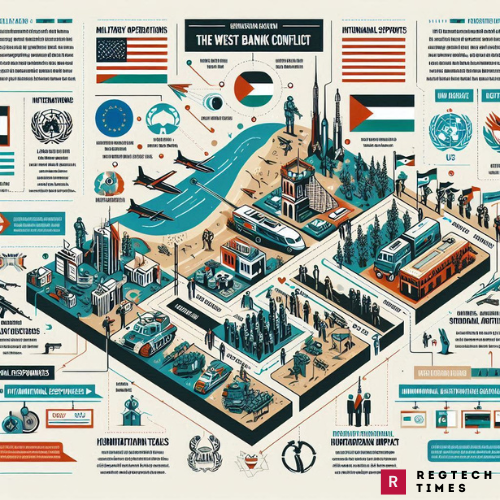Recent developments in the West Bank have intensified global concerns, bringing international leaders and organizations into the fray as the region’s volatility continues to escalate. With Israel’s military operations targeting militant networks, the international community is grappling with varied responses, including calls for restraint and sanctions proposals.
UN Secretary-General Urges Immediate Cessation of Violence in the West Bank
António Guterres, the United Nations Secretary-General, has expressed deep alarm over the deteriorating situation in the West Bank. Guterres has condemned the recent violence, which has resulted in significant casualties, including civilians and children. His spokesperson, Stéphane Dujarric, has called for an immediate halt to hostilities, emphasizing the urgent need for de-escalation to prevent further humanitarian suffering in the West Bank.
Israel’s Justification for West Bank Operations
In response to a surge in attacks against Israelis, Israel’s military has launched extensive operations in the West Bank, particularly focusing on cities like Jenin and Tulkarum. The Israeli government asserts that these actions are necessary to dismantle a terrorist network allegedly supported by Iran. Reports indicate that the operations have resulted in over ten Palestinian deaths. Israel defends these measures as essential for national security, citing approximately 150 attacks against Israelis originating from the West Bank since the Gaza conflict began.
The situation in the West Bank is further complicated by rising violence from extremist Israeli settlers against Palestinians. This increase in settler aggression has drawn international criticism and added to the calls for action from various global actors.
EU Proposes Sanctions in Response to Violence
In light of the escalating violence and human rights abuses in the West Bank, EU foreign policy chief Josep Borrell has proposed sanctions against Israeli Finance Minister Bezalel Smotrich and Police Minister Itamar Ben-Gvir. These officials are known for their controversial policies regarding illegal settlements in the West Bank. Borrell’s proposal, presented to the 27 EU member states, aims to address their role in perpetuating violence and human rights violations.
The timing and effectiveness of Borrell’s proposed sanctions remain uncertain, but the suggestion highlights the EU’s growing frustration and its commitment to addressing human rights concerns in the West Bank. This move is part of broader discussions within the EU about how to effectively respond to the conflict and support peace efforts.
US Actions and Settler Extremism
The United States has also taken steps to address extremism in the West Bank, recently imposing penalties on the Israeli NGO Haschomer Josch. This organization has been involved in extremist activities, including preventing Palestinian residents from returning to their village near Hebron. The U.S. State Department’s actions reflect a broader strategy to combat extremist activities and human rights abuses in the West Bank.
Media Groups Urge EU to Suspend Treaty and Impose Sanctions on Israel
Israeli Prime Minister Benjamin Netanyahu’s office has expressed strong opposition to these sanctions, emphasizing that such measures are taken very seriously by Israel. The Israeli government is expected to engage in discussions with the United States regarding these penalties and their implications for bilateral relations.
Global Consensus on Ending Violence
German Chancellor Olaf Scholz and Egyptian President Abdel Fattah al-Sisi have recently called for an end to the cycle of retaliatory violence in the West Bank. Both leaders stressed the need for a ceasefire and a resolution to the humanitarian crisis in Gaza while condemning illegal settlement expansion and extremist violence. Their shared commitment highlights the urgent need for a peaceful resolution to the conflict in the West Bank.
Prospects for Peace Amidst Ongoing Strife
The situation in Gaza continues to be tense, with ongoing hostilities and efforts to negotiate a truce. Recent reports indicate that an Israeli soldier’s body was found and returned from Gaza, and negotiations for a ceasefire are ongoing, mediated by Qatar, Egypt, and the U.S. The conflict has led to significant casualties, with the Hamas-controlled health authority reporting over 44,000 deaths.
As the international community navigates these complex dynamics, the need for a comprehensive and sustainable solution becomes increasingly clear. The UN’s call for restraint, combined with proposals for sanctions and diplomatic efforts, emphasizes the pressing need for renewed focus on peace and stability in the West Bank.
The escalating violence in the West Bank presents a formidable challenge to regional stability and international diplomacy. With differing perspectives and approaches to addressing the crisis, finding a path to peace remains difficult. However, the concerted efforts of global leaders and organizations provide hope for a resolution that prioritizes human rights and long-term stability.


